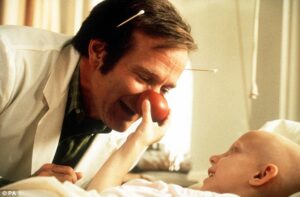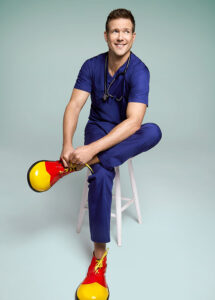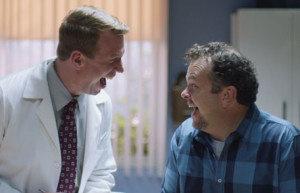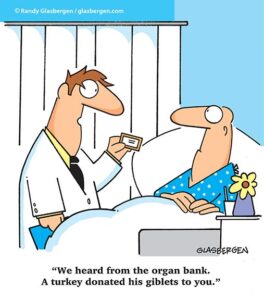April is Humor Month in Healthcare: Why Humor is the Best Medicine for Patient Experience

Why Humor is the Best Medicine for Patient Experience

If you asked people of any background to think of a word to describe a hospital, it is almost a certainty that many won’t say humorous. Despite what you may think, humor and healthcare share a long history. According to Jane Riffe et al, the relationship between humor and health goes way back to the 14th century. One of the first pioneers was Henri de Mondeville, a French surgeon, who purported that humor is a crucial part of the healing process.
Outside the healthcare arena, comedians such as George Carlin tell jokes about healthcare and medical practitioners. Carlin, once remarked, “Isn’t it a bit unnerving that doctors call what they do ‘practice’? Others like Jackie Mason remarked about modern society, “It’s no longer a question of staying healthy. It’s a question of finding a sickness you like.”
Humor, by definition, is a tool that helps us cope and get through our tougher days. Surely, a warm smile from a doctor or nurse does wonders for a patient experience. After all, this ‘warm smile’ and even having a light-hearted discussion -about last night’s sports results, or episode of a popular television program- may help to transform their negative outlook, into a more positive one. This improves patient experience. Yet patient experience is seemingly more spoken about than humor and healthcare?
What do we mean by patient experience?

Throughout the whole healthcare community, ‘patient experience’ is a central focus. The question, is “what do we mean by, ‘patient experience’?” Many have found patient experience is one of most difficult concepts to narrow down to one simple definition.
As shown by Jason. A Wolf, confining ‘patient experience’ to one definition is more complex than many may imagine. Wolf undertook a research project that spanned 14 years, from 2000-2014. His aim was to find an agreed upon, consistent definition. This project examined “a total of 18 sources (articles or organizational websites) …that provided a tangible, explicit definition of patient experience”. Wolf found all these organizational definitions shared common elements which include:
- Patient experience should be ‘tailor-made’ to meet patient’s needs
- A ‘partnership’ needs to be built between patient and care-giver
- The care-giver must ensure that the patient’s expectations are met.
So where does humor come into the equation?
Thankfully there are answers to this question. The school of therapeutic humor has found that a light hearted interaction really works. Research shows when applied effectively, therapeutic humor can strengthen the patients’ immune system. It can also “…improve digestion, and generate better sleep and pain management by increasing endorphins”. Other evidence shows that by helping the patient reframe their illness or treatment, it minimizes their anxiety.
Healthcare according to the Gesundheit approach

One of the better known uses of therapeutic humor is the approach used by Patch Adams (Hunter Doherty “Patch” Adams). Many recall the endearing character played by Robin Williams, who brought a smile to his patients’ faces with a more humorous and lighter approach.
In 2006, the real life Patch Adams founded the Gesundheit Institute GGO. This organization carries out clowning missions around the world. Their aim is to enrich the lives of those living in communities torn by sickness, injustice and poverty. In addition to this work, the Gesundheit Institute has educational programs. Their main aim is to steer hospitals away from the established money- making focused business model.
Does Humor work in Healthcare Practice?

Research shows that humor and the approach proposed by the Gesundheit Institute is very effective.
Canadian researchers found humor plays a key role in some of the most acute healthcare settings. This research team spent nearly 300 hours interviewing and observing staff, patients and their families. Their research took place at an intensive care unit and a care palliative care unit for people with terminal illnesses.
At the palliative and ICU, they found that humor was used by patients to distance themselves from difficult circumstances. As one interviewee observed, “When you’ve had the most stressful day and you’re ready to cry, sometimes it’s easier to bring out humor and take it in the other direction instead of bawling on somebody’s shoulder”.
It also worked to bring healthcare teams closer as one medical professional commented, “If you have those fun moments and that connected-ness even the worst hell can happen”…This helps many healthcare workers leave their day without carrying unwanted extra baggage.
The story about the bubble helmet
Research also showed that lighter interactions between staff and patients had a positive effect on both. In one instance, a healthcare aid took a joke picture of a patient with a bubble bath hat on his head to put his mind at ease. In the end, this bubble bath helmet became one of the patient’s most prized possessions.
Despite the research showing many positive outcomes, there were also concerns. They found that too much humor can have a negative effect in preventing serious discussion with patients. As one nurse said, “If I’m joking with you. I’m interacting with you. We’re talking but I don’t ask you what’s bugging you…I’m not finding out why you’re upset.

In conclusion, humor really can make a difference to patient experience. It can boost patients’ immune system so they can fight their illness. Patch Adam’s work in building up and educating communities around the world is performing a tremendous service to healthcare. Other evidence shows that humor and light heartedness can also create a stronger bond between healthcare team members. On the flip side, too much humor may not be a good thing. It can create a distance between with dealing with more serious and delicate healthcare matters. Surely the solution is to find a balance between humor and a more serious, professional approach to patient care.
BY: Jonathan Gordon, Merraine Group®
Resources:
https://pxjournal.org/journal/vol1/iss1/3/
https://hub.jhu.edu/magazine/2016/summer/humor-therapy-nursing-medicine/
https://msue.anr.msu.edu/news/history_of_humor_and_health
https://content.time.com/time/specials/packages/article/0,28804,1858074_1858085_1858081,00.html
https://www.brainyquote.com/quotes/quotes/j/jackiemaso102448.html
https://www.sciencedaily.com/releases/2008/04/080408112104.htm

